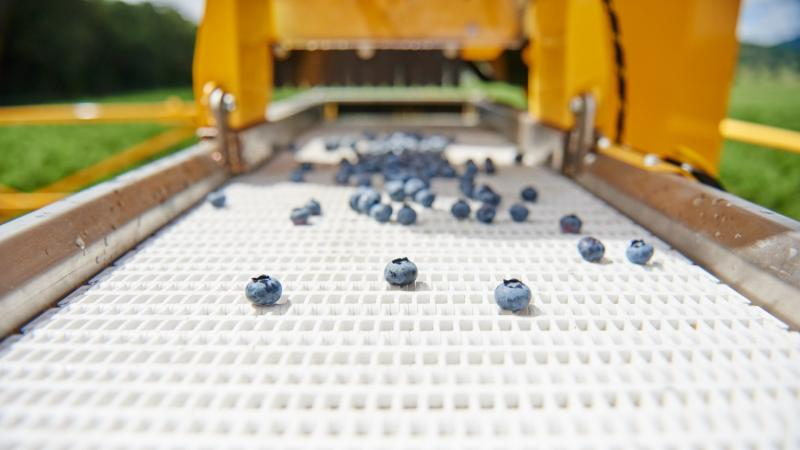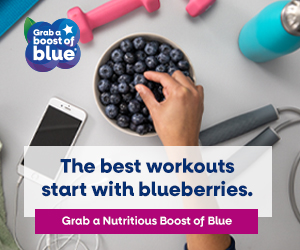Topics in this issue of Behind the Blue:
- USHBC Receives Foreign Nongovernmental Organization Registration
- ‘Boost Your Workout’ Partnership With Life Time Fitness
- Convention Recap: Macro Trends Impacting the Blueberry Industry
USHBC Receives Foreign Nongovernmental Organization Registration

The U.S. Highbush Blueberry Council recently received approval from the Chinese government for its registration as a Foreign Nongovernmental Organization (FNGO).
When USHBC initially launched its China program, we immediately began seeking this registration to comply with the “Law on Administration of Activities of Overseas Nongovernmental Organizations in the Mainland of China,” which was implemented by the Chinese government in 2017. USHBC’s registration approval comes after working with the U.S. State Department, the Embassy of the People’s Republic of China in Washington, D.C., and the Shanghai Public Security Bureau for more than a year-and-a-half to authenticate and submit all necessary documentation.
By completing its FNGO registration, USHBC is now officially approved to conduct marketing activities in China. This milestone is an important step in USHBC’s China program development, and will allow us to ramp up promotional activities in the country. USHBC is excited about this next step in its China program and seeing how the market continues to develop for the industry.

To properly recover after a tough workout, a healthy diet is critical. Blueberries have antioxidant and anti-inflammatory properties – meaning they are not only part of a healthy diet, but may also enhance exercise performance and recovery!
To help you share the benefits of blueberries, we developed the new “Boost Your Workout” Industry Toolkit. Turnkey content, including print-ready resources, social graphics, digital ads and pre- and post-workout inspired recipes, deliver enticing and informative facts about blueberries and their role in supporting a healthy lifestyle.
In addition to developing the “Boost Your Workout” toolkit, USHBC is partnering with Life Time Fitness as an official sponsor of its 60daySM Challenge designed to provide daily support, resources and motivation for anyone looking to jumpstart their health goals. Life Time has over 150 locations nationwide, providing USHBC the opportunity to reach thousands of wellness enthusiasts by encouraging them to Grab a Boost of Blue before and after their workouts. The partnership includes e-newsletter features showcasing blueberry health insights, potential in-person sampling opportunities and a full-page advertisement in Life Time’s Experience Life magazine that has over two million readers.


USHBC is here to help with all your yearly blueberry promotions. We have other power period toolkits for use during seasons of peak promotion, as well as dozens of evergreen images, recipes and QR codes, ready for download on the Turnkey Content page.
Convention Recap: Macro Trends Impacting the Blueberry Industry

Macroeconomic forces shape the future of the blueberry industry. At the recent Blueberry Convention, David Magaña, senior analyst of horticulture at Rabobank, highlighted implications for consumer demand for fresh fruit, and challenges related to blueberry production growth.
Demand drivers for fruit include plant-based growth, taste and convenience, rising incomes, and health and wellness, while on the supply side, there are land, water, regulatory, labor and logistical constraints. Magaña noted that with inflationary pressures on both ends, monetary policy will reduce demand-driven inflation. Currently, interest rates are below inflation, which is not ideal for investing in innovation. Supply-driven inflationary pressures are also receding, and global growth is projected to slow further.
On-time arrivals of container ships are steadily improving, meaning better quality fruit is reaching consumers more frequently. There’s also still room for growth in fresh fruit availability in the U.S. Berries continue to be one of the top valued fresh fruits. Blueberries are currently at 43% of household penetration (compared to 58% for strawberries), ranking as the seventh most consumed fruit in the U.S.
Ultimately, consumers are in search of value. Inflation has had an influence on the increase in dollar sales between 2020 and today. Visits to grocery stores dropped in Q4 2022, with the exception of discounters and warehouse clubs, and retailers that appeal to value came out ahead in 2022. Foodservice has also experienced shrinking checks and attendance. In fact, restaurant transactions decreased in 2022, despite the end of the pandemic, with an exception for coffee shop and cafe transactions, which increased as consumers cut out higher-priced, eating-out occasions.
Blueberry consumption is expanding globally, particularly in China, where consumption was nonexistent back in 2012. Since then, availability has expanded dramatically and record-setting exports are likely moving forward every year. Addressing macroeconomic issues is complex, but innovation has always been the answer. Learn more about global dynamics in the blueberry industry in Rabobank’s report here.
